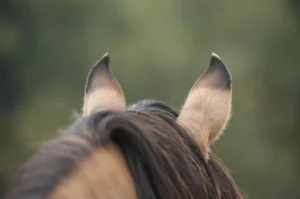Horses are incredibly sensitive creatures, highly attuned to everything happening around them.
This sensitivity plays a major role in how they interact with the world, from their behavior to their response to human care. Horses rely on their senses to navigate their environment, detect danger, and communicate with other horses and humans. Understanding why horses are so sensitive to their environment can help us become better caretakers, trainers, and companions. Let’s explore the factors that contribute to a horse’s heightened sensitivity.
1. Instincts for Survival
Horses are prey animals, which means their survival has always depended on their ability to detect potential threats. In the wild, this heightened sensitivity allowed horses to detect predators and react quickly to flee. Even though domesticated horses are not facing the same dangers, they retain these survival instincts. They remain hyper-aware of their surroundings, constantly monitoring changes in their environment that could signal danger. For instance, a slight rustling in the bushes or the sudden appearance of an unfamiliar animal can make a horse alert and tense.
This instinctive vigilance also makes horses sensitive to sudden movements or changes in their surroundings, which can startle them. Their highly developed senses help them maintain this constant awareness, allowing them to react quickly when needed.
2. Acute Hearing and Vision

Horses’ hearing is much more sensitive than that of humans. They can hear a wider range of frequencies and detect even the softest sounds. Their ears rotate 180 degrees, giving them a wide auditory range. This ability allows horses to pick up on distant sounds, like the approach of a predator or another animal. In addition to their acute hearing, horses have excellent peripheral vision, covering nearly 360 degrees. This wide field of vision allows them to spot danger from almost any direction.
However, horses have a blind spot directly in front of their faces and behind them, which is why sudden movements in these areas can startle them. They also have the ability to see well in low light, making them sensitive to changes in lighting or shadows that can occur at dawn or dusk.
3. Sensitivity to Smell and Touch

Horses’ sense of smell is highly developed. They can identify other horses, animals, and even humans through scent, which is important for social interaction and identifying potential threats. For example, they can detect when a new animal enters their territory or when a predator is nearby. A horse might react strongly to unfamiliar smells, such as new feed, a strange person, or the scent of a predator.
Touch is another area where horses are exceptionally sensitive. Their skin contains an abundance of nerve endings, particularly in areas like their muzzle, neck, and sides. This heightened sensitivity allows them to feel the slightest pressure, making them very responsive to physical contact. This is why they are so aware of a rider’s cues and can respond to even the smallest shifts in rein pressure or leg aids.
4. Sensitivity to Routine Changes
Horses are creatures of habit and thrive on routine. They are highly sensitive to changes in their daily schedule, including feeding times, turnout, or who is handling them. If their routine is disrupted—whether it’s a change in the stable environment, the introduction of a new handler, or a shift in their daily activities—horses can become anxious, stressed, or agitated. A horse that is used to being fed at a specific time may whinny or act out if feeding is delayed or altered in any way.
This sensitivity to changes in routine is part of their need for security and stability. Consistency is key to keeping a horse calm and comfortable. When a horse’s environment or schedule shifts, they may need time to adjust and may show signs of unease during this transition period.
5. Emotional Sensitivity and Bonding
Horses are emotionally sensitive and can pick up on the feelings of those around them, especially humans. They are highly perceptive of body language and often mirror the emotions of their handler. If a rider is nervous or tense, the horse is likely to feel this and may become anxious or uncooperative. Conversely, if the rider is calm and confident, the horse is more likely to mirror those positive emotions.
This emotional sensitivity contributes to the bond between horse and rider. Horses are social animals that form strong connections with their caretakers. They often respond to their handlers’ emotional states and show empathy by offering comfort or seeking reassurance. Understanding this emotional awareness can help build a trusting relationship with a horse, ensuring better communication and cooperation.
6. Environmental Factors Affecting Behavior
Horses are also very responsive to changes in their physical environment, such as shifts in the weather, new animals in the area, or unfamiliar objects. For example, many horses become agitated or restless before a storm, as they can sense changes in barometric pressure. Similarly, a horse might react nervously to loud noises, such as fireworks or traffic sounds, or to new items in their stable. These changes in their environment can lead to behaviors like pacing, nickering, or even refusing to eat or interact.
Horses are naturally curious, so they may approach new objects or smells with caution. However, if they feel threatened or uneasy, their sensitivity can cause them to shy away or become reactive.




